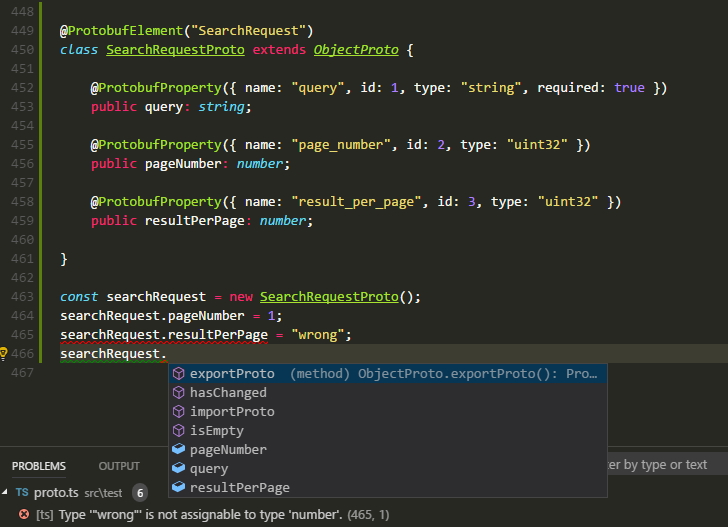tsprotobuf
v1.0.19
Published
`tsprotobuf` is a helper library equipped with functions designed to facilitate the integration of ProtoBuf in TypeScript.
Downloads
2,282
Readme
tsprotobuf
tsprotobuf is a helper library equipped with functions designed to facilitate the integration of ProtoBuf in TypeScript.
Installation
To install tsprotobuf, you can use npm as follows:
npm install tsprotobufUsage
You can import and use tsprotobuf in your project as shown below:
In JavaScript:
const tsprotobuf = require("tsprotobuf");In TypeScript:
import {ObjectProto, ProtobufElement, ProtobufProperty} from "tsprotobuf";Example of a Protobuf schema:
message SearchRequest {
required string query = 1;
optional int32 page_number = 2;
optional int32 result_per_page = 3;
}
Usage Examples
Here are some examples demonstrating how to use the tsprotobuf library to serialize and parse protobuf messages. The examples use the async/await syntax for handling promises.
Serialization
import { ProtobufElement, ProtobufProperty, ObjectProto } from "tsprotobuf";
@ProtobufElement({name: "SearchRequest"})
class SearchRequest extends ObjectProto {
@ProtobufProperty({id: 1, name: "query", required: true, type: "string"})
public query: string;
@ProtobufProperty({id: 2, name: "page_number", type: "int32"})
public pageNumber: number;
@ProtobufProperty({id: 3, name: "result_per_page", type: "int32"})
public resultPerPage: number;
}
// Use the class
const request = new SearchRequest();
request.query = "OpenAI";
request.pageNumber = 1;
request.resultPerPage = 10;
// Export the class instance into a protobuf message
async function serializeRequest() {
try {
const buffer = await request.exportProto();
// `buffer` is an ArrayBuffer containing the serialized message
} catch (error) {
console.error("Failed to serialize message:", error);
}
}
serializeRequest();Parsing
import { ProtobufElement, ProtobufProperty, ObjectProto } from "tsprotobuf";
@ProtobufElement({name: "SearchRequest"})
class SearchRequest extends ObjectProto {
@ProtobufProperty({id: 1, name: "query", required: true, type: "string"})
public query: string;
@ProtobufProperty({id: 2, name: "page_number", type: "int32"})
public pageNumber: number;
@ProtobufProperty({id: 3, name: "result_per_page", type: "int32"})
public resultPerPage: number;
}
// Given a serialized message as an ArrayBuffer
const buffer: ArrayBuffer;
// Import the protobuf message into a class instance
async function parseRequest() {
try {
const request = await SearchRequest.importProto(buffer);
// `request` is a `SearchRequest` object
// Now you can access properties
console.log(request.query);
console.log(request.pageNumber);
console.log(request.resultPerPage);
} catch (error) {
console.error("Failed to parse message:", error);
}
}
parseRequest();Please note that this example assumes that the SearchRequest message is simple. Parsing and serialization of nested messages or repeated fields might need additional logic or custom converters.
Decorators
For more information on how to use decorators in TypeScript, you can check the official TypeScript documentation on decorators.
ProtobufElement
A decorator for class.
| Parameter | Type | Description |
|-----------|------------|----------------------------------------------------------------------------------------------|
| name | string | Name of the scheme in the Protobuf model. Optional. If name is not specified, the name of the class is used. |
Example
@ProtobufElement({name: "Person"})
class PersonProto {
// class body here
}ProtobufProperty
A decorator for class properties.
| Parameter | Type | Description |
|--------------|------------|--------------------------------------------------------------------------------------------|
| name | string | Name of the property in the Protobuf schema |
| id | number | Index of the property in the Protobuf message |
| required | boolean | Indicates whether the property is required |
| repeated | boolean | Indicates whether the property is repeated |
| type | string | Simple Protobuf type, e.g., bytes, uint32, bool, etc. The default value is bytes |
| converter | IConverter | Converter for complex data types |
| defaultValue | any | Default value for the property |
| parser | typeof ObjectProto | Parser class for nested Protobuf messages |
Examples
The following examples demonstrate the usage of ProtobufElement and ProtobufProperty decorators.
Basic Protobuf message:
Protobuf schema:
message SearchRequest { required string query = 1; optional int32 page_number = 2; optional int32 result_per_page = 3; }TypeScript:
@ProtobufElement("SearchRequest") class SearchRequestProto extends ObjectProto { @ProtobufProperty({ name: "query", id: 1, type: "string", required: true }) public query: string; @ProtobufProperty({ name: "page_number", id: 2, type: "uint32" }) public pageNumber: number; @ProtobufProperty({ name: "result_per_page", id: 3, type: "uint32" }) public resultPerPage: number; }Using converters: Converts
Uint8Array(bytes) toArrayBuffer.Protobuf schema:
message SecureRequest { optional int32 version = 1; optional bytes key = 2; }TypeScript:
@ProtobufElement("SecureRequest") class SecureRequestProto extends ObjectProto { @ProtobufProperty({ name: "version", id: 1, type: "uint32" }) public version: number; @ProtobufProperty({ name: "key", id: 2, type: "bytes", converter: ArrayBufferConverter }) public key: ArrayBuffer; }Nested types.
Protobuf schema:
message SearchResponse { message Result { required string url = 1; optional string title = 2; } optional Result result = 1; }TypeScript:
@ProtobufElement("Result") class ResultProto extends ObjectProto { @ProtobufProperty({ name: "url", id: 1, type: "string", required: true }) public url: string; @ProtobufProperty({ name: "title", id: 2, type: "string" }) public title: string; } @ProtobufElement("SearchResponse") class SearchResponseProto extends ObjectProto { @ProtobufProperty({ name: "result", id: 1, type: "bytes", parser: ResultProto }) public result: ResultProto; }Extending classes.
@ProtobufElement("BaseMessage") class BaseProto extends ObjectProto { @ProtobufProperty({ name: "version", id: 1, type: "uint32", defaultValue: 1 }) public version: number; } @ProtobufElement("RequestMessage") class RequestMessageProto extends BaseProto { @ProtobufProperty({ name: "text", id: 2, type: "string" }) public text: string; }Repeating fields.
Protobuf schema:
message CryptoKey { required string algorithm = 1; required string type = 2; required bool extractable = 3; repeated string usages = 4; } message CryptoKeys { repeated CryptoKey keys = 1; }TypeScript:
@ProtobufElement("CryptoKey") class CryptoKeysProto extends ObjectProto { static INDEX = 0; @ProtobufProperty({ id: CryptoKeyProto.INDEX++, type: "string", required: true }) public algorithm: string; @ProtobufProperty({ id: CryptoKeyProto.INDEX++, type: "string", required: true }) public type: string; @ProtobufProperty({ id: CryptoKeyProto.INDEX++, type: "bool", required: true }) public extractable: boolean; @ProtobufProperty({ id: CryptoKeyProto.INDEX++, type: "string", repeated: true
License
MIT
Support
Please file an issue on the GitHub page for this project if you experience any problems or have suggestions for improvements.
Contributions
We welcome all contributions. Please submit a pull request on the GitHub page for this project.

